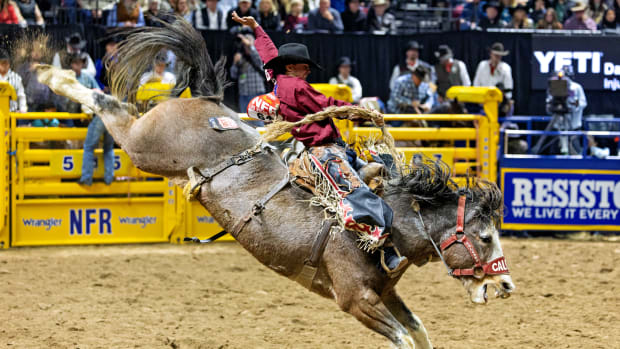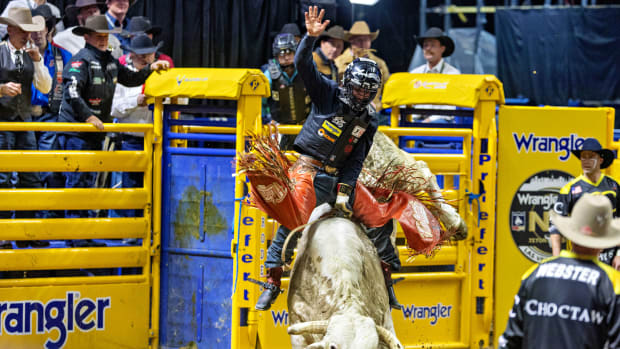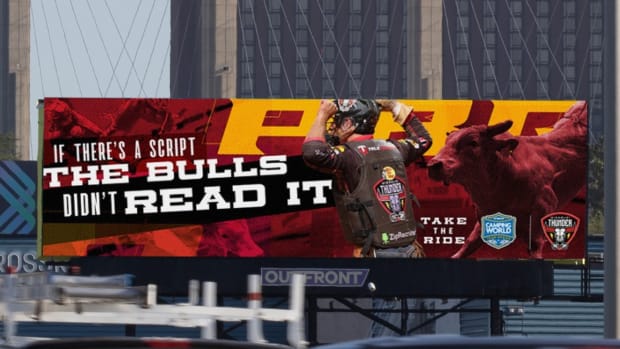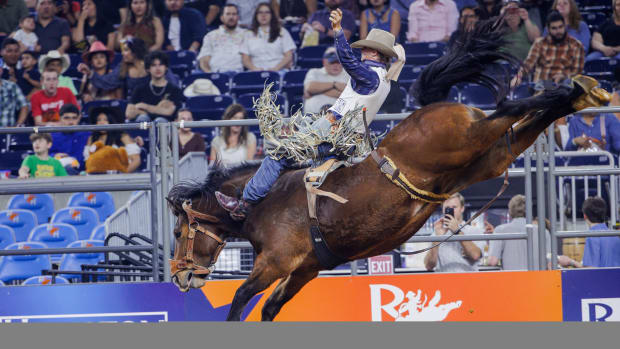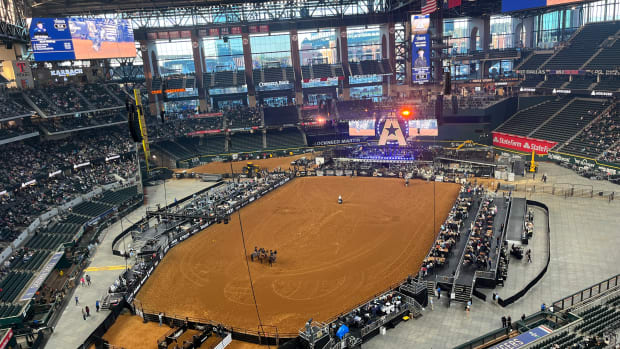NCEA Riders Find Balance and Success Navigating Collegiate, Industry Competitions
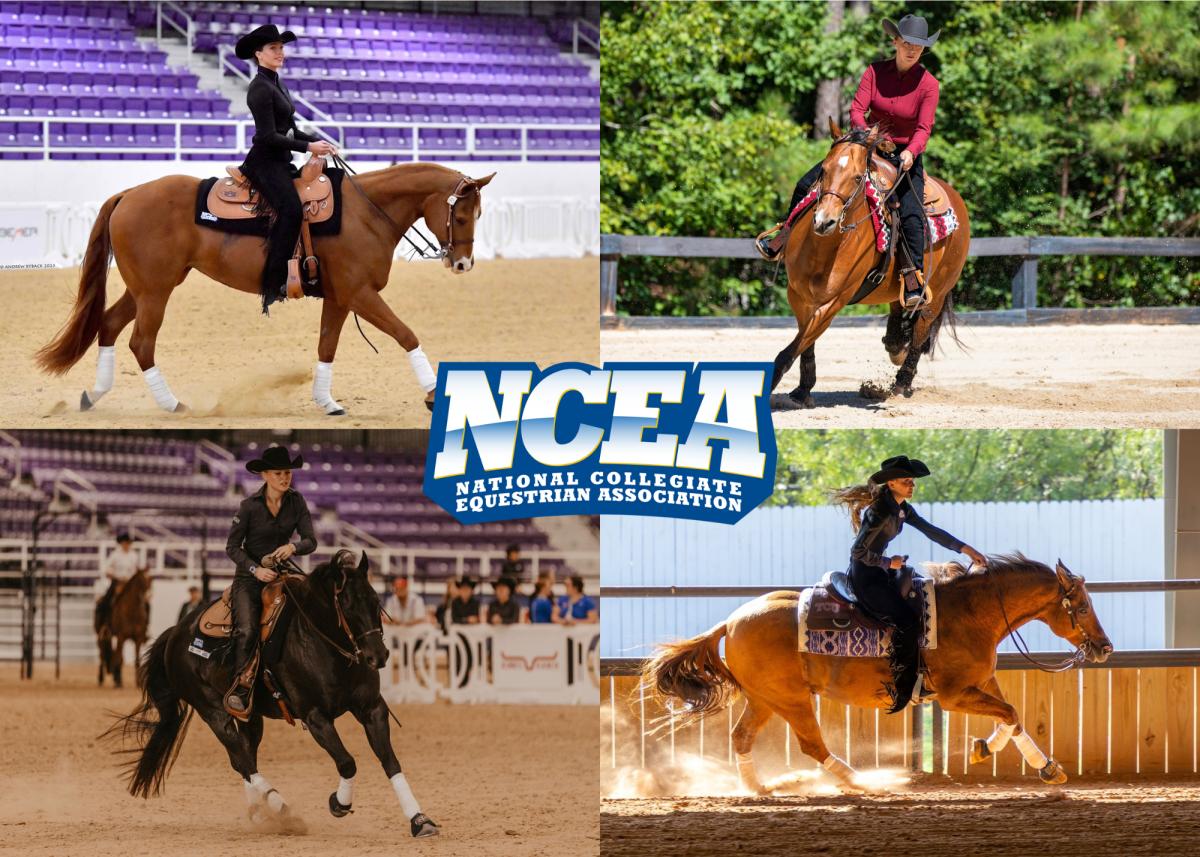
No matter how many times she rides at the Jim Norick Arena, the nerves still get to Giorgia Medows.
This year was no different as Medows returned to Oklahoma City to take part in the 2023 American Quarter Horse Association (AQHA) World Show in November, winning the Level 3 Amateur Horsemanship class.
What helps in navigating the experience? Having a support system, a buddy who understands what you’re going through. And, sometimes, that friend just happens to be your competition.
Finishing as Reserve World Champion in the same event with Medows was Payton Boutelle – her teammate on the TCU equestrian program, roommate back in Fort Worth and now one of her closest friends.
“It’s really cool to experience getting to do what we do, going from an individual sport (as a kid) to a team sport. You’re competing against the same group of girls that you have your entire life – then suddenly you’re thrown on a team and it’s not about you anymore, it’s about us and what you can do together as a team,” Meadows said of competing with Boutelle at TCU. “I feel like this dynamic has really transferred over to the World Show. We’re always at the back gate cheering the other one on. It’s been a really cool experience to get to do it with her and build that relationship on the team.”
The balance between individual shows in the equine industry and working as a team to win a college national championship is something many riders simultaneously navigate.
The National Collegiate Equestrian Association (NCEA) was established in 1998 by the NCAA to serve as the governing body of Division I and II collegiate equestrian athletics for programs across the country. Identified as an emerging sport with the potential to be NCAA sanctioned in the future, NCEA competitors are under the same guidelines as all other NCAA athletes.
One minor difference between traditional NCAA sports and the NCEA is the opportunity to compete in-season at external events. While most NCAA athletes focus solely on the competition happening at their respective schools, many equestrians balance team-related requirements like practice and meets with national and even international showcase events.
This year alone, numerous NCEA riders have displayed their talents across the globe. SMU’s Augusta Iwasaki represented the United States as part of the International Federation for Equestrian Sports (FEI) Youth Nations Cup in Belgium. Georgia’s Tessa Downey took part in the Maclay Finals in Kentucky, placing third in a field of 228 competitors. Oklahoma State had two riders, Riley Hogan and Grace McReynolds, do well at USEF and USHJA events, respectively, this fall.
Getting from campus to these external opportunities is anything but easy.
“It was definitely challenging trying to manage everything with the TCU equestrian team and then trying to get myself ready to compete at the World Championship show, and with my academics on top of that,” Boutelle said, noting that her professors were gracious enough to let her work ahead or set up make-up opportunities. “My coaches were great about letting me make up practices and come in on my own time to put in the work, because I did miss about a week from the World Championship show – that’s definitely a lot of days to be missing. Staying ahead was the biggest thing for me.”
Balancing the requirements of being a Division I athlete isn’t the only challenge these talented riders face in competing at these showcases.
Going to school means leaving home and, very often, leaving a show horse in the hands of a trainer. For many, arriving a few days early to a competition for practice is often the first time they’ve ridden their horse in several weeks, if not months.
While it can be a little strange to go from not riding an animal to competing together on a sizable stage, the life of an NCEA rider prepares competitors for similar situations.
As part of NCEA meets during the season, athletes ride horses provided by the school they are competing at. Sometimes, that means a horse they are familiar with at their home barn. On the road, it means riding horses they’ve never seen before. Everyone is given four minutes to warm-up before stepping into the arena.
In one world, it’s luck of the draw. In the other world, it’s an animal they have a relationship with but might not have seen in months. While they are different, both test a competitor’s skills in different ways.
“My trainer always tries to tell me, ‘You’re not on your school horses anymore. You’ve got to trust him.’ Because the school horses can be a little silly sometimes. I think it took a few practice rides for things to click and get back to where they were,” said South Carolina’s Chloe VanStone of her recent experience at the National Reining Horse Association (NRHA) Non Pro Futurity event this fall. “Getting that confidence from such a good horse with a great trainer is huge and it really does help me when I get back to school.”
Whether pursuing industry recognition or a college national title, success at both levels are what these student-athletes are chasing and balancing.
But the rewards are worth it.
For SMU’s Dani Latimer, this journey in both worlds has been special. Last year, she was named Most Outstanding Reining Performer at the NCEA National Championship, helping the Mustangs secure the program’s first national title.
A few weeks ago, the fifth-year senior captured the Level 1 Championship at the NRHA Non Pro Futurity show, along with co-championships of Levels 2 and 3. Her horse, Snap My Crush, is the offspring of her first show horse from almost 10 years ago, Snapbacks.
While the road to each championship was vastly different, Latimer is grateful for the opportunity to pursue what she loves.
“Being able to watch him go through the stages of growing, training and him turning into a show horse, it’s just been a super memorable fall season on him. Every time he went in the show pen with me, he gave me everything he had,” Latimer said. “[The SMU coaches], they support it so much. If we’re doing everything else that we need to as far as the team and academics, they support us going out and showing and representing the school and ourselves. I think that’s a huge benefit to have when you have those people of that much importance in your corner to support you to do that.”

